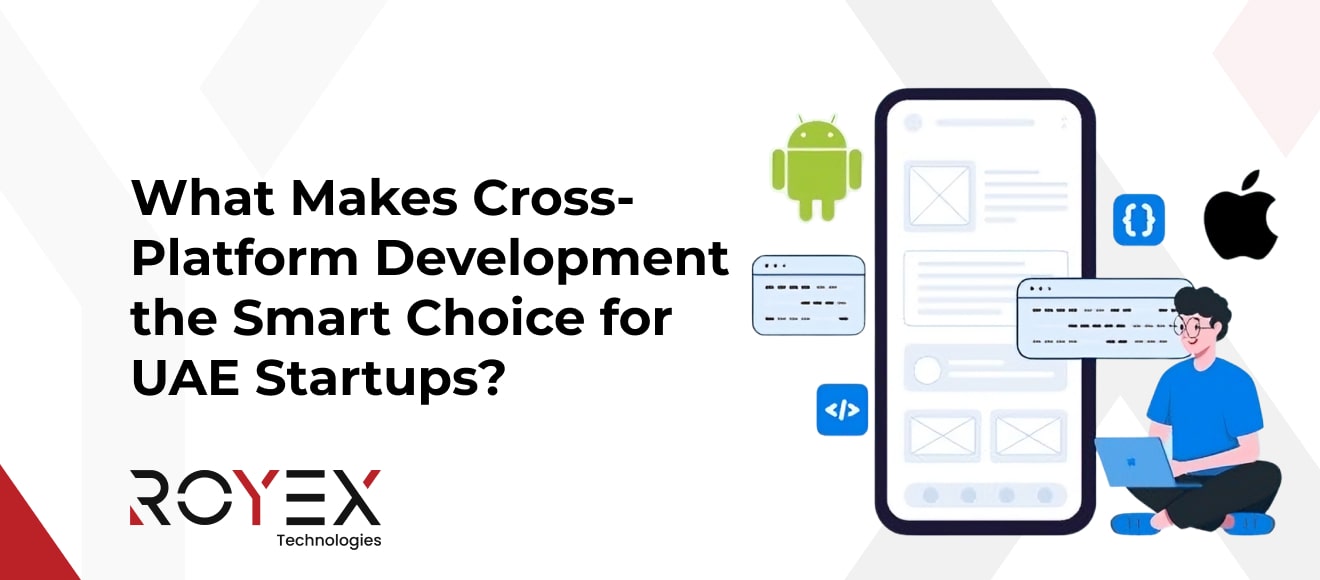
What Makes Cross-Platform Development the Smart Choice for UAE Startups?
The United Arab Emirates (UAE) has rapidly transformed into a global hub for business, technology, and innovation. With Dubai positioning itself as a smart city and Abu Dhabi heavily investing in digital transformation, startups in the UAE are uniquely placed to leverage technology for growth. Among these technologies, mobile applications remain one of the most powerful tools for businesses to connect with customers, optimize operations, and scale efficiently.
However, one of the most crucial decisions startups face is choosing the right development approach: native development or cross-platform development. For UAE startups—many of which need to balance limited budgets with ambitious growth goals—cross-platform app development often emerges as the smarter choice.
Cross-platform development allows businesses to create applications that work seamlessly across multiple operating systems like iOS and Android, using a single codebase. This approach not only reduces development costs but also accelerates time-to-market—two factors critical for UAE startups in fast-paced industries like fintech, e-commerce, healthcare, travel, and real estate.
This article explores why cross-platform development is the ideal option for UAE startups, supported by Middle East digital economy insights, and concludes with why Royex Technologies is the leading choice for mobile app development Dubai.
The Growing Importance of Mobile Apps in the UAE
Mobile apps are no longer just add-ons for businesses—they are often the primary channel for customer engagement.
-
In the UAE, smartphone penetration is among the highest in the world, with rates exceeding 90%.
-
The UAE’s e-commerce market is projected to grow significantly, fueled by mobile-first shoppers.
-
The government’s emphasis on paperless transactions and digital-first services has set a precedent, pushing both enterprises and startups to prioritize mobile solutions.
-
Sectors like banking, healthcare, logistics, and education in the UAE are witnessing rapid digitization, with apps serving as the foundation for customer interaction.
For startups, this creates both an opportunity and a challenge. To compete in such a digitally advanced market, apps must be future-ready, scalable, and optimized for diverse users across platforms. This is exactly where cross-platform app development shines.
Understanding Cross-Platform App Development
Cross-platform app development involves creating a mobile application that runs seamlessly on multiple operating systems from a single codebase. Instead of developing separate apps for iOS and Android, developers use frameworks like Flutter, React Native, Xamarin, or Ionic to build one application that works on both platforms.
Key Benefits:
-
Single Codebase – Develop once, deploy everywhere.
-
Cost Efficiency – Reduces development and maintenance costs.
-
Faster Time-to-Market – Quicker launches, essential for startups.
-
Consistency – Uniform look and feel across platforms.
-
Ease of Updates – One update covers all platforms.
For startups in Dubai and the wider UAE, where market dynamics change rapidly, these advantages provide a clear edge.
Why Cross-Platform Development is the Smart Choice for UAE Startups
1. Budget-Friendly Development
Startups often operate on tight budgets. Native development for iOS and Android requires two separate teams, double the effort, and higher costs. Cross-platform development, however, reduces expenses by up to 40%.
For a UAE startup trying to break into the market—whether launching a delivery app, fintech solution, or a healthtech platform—cost savings can be the difference between success and failure.
2. Faster Time-to-Market
Dubai’s startup ecosystem is highly competitive. Launching an app quickly means gaining a first-mover advantage. With cross-platform frameworks, startups can significantly cut down on development time by reusing code and focusing on core features instead of duplicating work.
3. Wider Market Reach
The UAE is a multicultural hub with residents from over 200 nationalities. Businesses cannot afford to target only iOS or Android users. Cross-platform development ensures startups cater to both audiences without alienating a segment of potential users.
4. Scalability for Future Growth
UAE startups often aim to expand beyond Dubai and Abu Dhabi into the GCC and broader Middle East. Cross-platform apps are easier to scale, making them ideal for businesses that want to grow regionally.
5. Consistency Across Platforms
Brand identity is crucial in competitive markets. Cross-platform development ensures a consistent user interface (UI) and user experience (UX) across devices, strengthening brand recognition and customer trust.
6. Simplified Maintenance and Updates
In Dubai’s digital economy, staying updated is essential. With cross-platform apps, startups only need to update a single codebase, making maintenance faster and more affordable.
7. Alignment with UAE’s Digital Vision 2031
The UAE government has laid out ambitious digital transformation strategies. Cross-platform apps align perfectly with these goals by offering startups an agile, scalable, and innovative approach to building digital-first businesses.
Industry Use Cases of Cross-Platform Development in the UAE
1. E-Commerce Startups
With UAE’s e-commerce market surpassing billions in value, startups launching online marketplaces, fashion apps, or grocery delivery platforms can use cross-platform apps to reach all customers instantly.
2. Fintech
Digital banking and payment apps require rapid development and frequent updates. Cross-platform frameworks support these needs efficiently.
3. Healthcare
Telemedicine apps in the UAE are growing post-pandemic. Startups can launch affordable cross-platform apps that cater to both iOS and Android users simultaneously.
4. Travel & Tourism
With Dubai as a global tourism hub, startups in hospitality and travel benefit from apps that are accessible to all tourists, regardless of device.
5. Real Estate
Cross-platform apps allow startups to quickly develop property listing platforms or rental apps to cater to Dubai’s dynamic real estate sector.
Stats That Support Cross-Platform Growth in UAE
-
Over 95% of UAE residents use smartphones daily.
-
Mobile commerce in the Middle East is projected to grow at over 20% annually.
-
Around 70% of app users in the UAE expect businesses to offer seamless apps across both iOS and Android.
-
Startups that launch apps faster have a 30% higher chance of attracting early adopters in the UAE market.
These stats underline why cross-platform development is not just a cost-saving measure but a growth strategy.
Common Myths About Cross-Platform Development
-
“Performance is compromised.”
Modern frameworks like Flutter and React Native provide near-native performance, debunking this myth. -
“UI won’t look good.”
With proper design practices, cross-platform apps can look and feel just as polished as native apps. -
“It’s only for small projects.”
Many global apps—including Uber, Airbnb, and Instagram—use cross-platform frameworks, proving scalability.
Future of Cross-Platform Development in the UAE
As the UAE moves toward becoming a global digital economy leader, cross-platform development will grow in demand. Its ability to combine cost-efficiency with scalability makes it perfect for startups aiming to thrive in Dubai’s competitive market.
Emerging technologies like AI, AR/VR, blockchain, and IoT can also be integrated with cross-platform frameworks, enabling startups to innovate faster without high costs.
Why Royex is the Best Choice for Mobile App Development Dubai
When it comes to choosing a reliable partner for mobile app development Dubai, startups need a company that combines technical expertise with regional market knowledge. This is where Royex Technologies excels.
Why Royex?
-
Experience in UAE Market – Deep understanding of Dubai’s startup ecosystem.
-
Cross-Platform Expertise – Skilled in Flutter, React Native, and other top frameworks.
-
Custom Solutions – Tailored apps for industries like e-commerce, fintech, healthcare, and travel.
-
Affordable & Scalable – Perfect balance of cost-effectiveness and innovation.
-
Future-Ready Apps – Integration with AI, IoT, and blockchain for startups with big ambitions.
Royex has successfully delivered hundreds of apps for clients across the UAE and GCC, making it the go-to partner for startups that want to launch quickly, scale efficiently, and stay competitive.
Conclusion
For UAE startups, the decision to go with cross-platform app development is not just about saving costs—it’s about building scalable, consistent, and future-ready applications that align with Dubai’s vision of becoming a global digital hub.
By choosing the right partner like Royex Technologies, startups can ensure their apps are not only built to compete today but also evolve with the technologies of tomorrow. If you’re searching for the best in mobile app development Dubai, Royex stands out as the smart, reliable, and future-focused choice.





